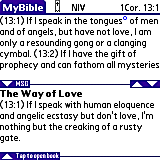
Microsoft Office, or simply Office, is a family of client software, server software, and services developed by Microsoft. It was first announced by Bill Gates on August 1, 1988, at COMDEX in Las Vegas. Initially a marketing term for an office suite, the first version of Office contained Microsoft Word, Microsoft Excel, and Microsoft PowerPoint. Over the years, Office applications have grown substantially closer with shared features such as a common spell checker, OLE data integration and Visual Basic for Applications scripting language. Microsoft also positions Office as a development platform for line-of-business software under the Office Business Applications brand. On July 10, 2012, Softpedia reported that Office was being used by over a billion people worldwide.

Palm OS is a discontinued mobile operating system initially developed by Palm, Inc., for personal digital assistants (PDAs) in 1996. Palm OS was designed for ease of use with a touchscreen-based graphical user interface. It is provided with a suite of basic applications for personal information management. Later versions of the OS have been extended to support smartphones. Several other licensees have manufactured devices powered by Palm OS.
Java Platform, Micro Edition or Java ME is a computing platform for development and deployment of portable code for embedded and mobile devices. Java ME was formerly known as Java 2 Platform, Micro Edition or J2ME.

macOS Server, formerly named Mac OS X Server and OS X Server, is a discontinued, stand-alone server operating system by Apple Inc.. It is also the name of its replacement software, an operating system addition, for macOS that provides additional server programs along with management and administration tools for iOS and macOS.

Palm is an American technology company that developed and designed Personal Digital Assistants (PDAs), mobile phones, and software. Palm devices are often remembered as "the first wildly popular handheld computers," responsible for ushering in the smartphone era. Palm's first PDAs ran the Palm OS, were smaller than competing handhelds, and proved to the industry that there was a market for a new category of portable computing device.
C++Builder is a rapid application development (RAD) environment, originally developed by Borland and as of 2009 owned by Embarcadero Technologies, for writing programs in the C++ programming language targeting Windows NT, macOS, iOS and Android. C++Builder combines the Visual Component Library and IDE written in Object Pascal with multiple C++ compilers. Most components developed in Delphi can be used in C++Builder with no or little modification, although the reverse is not true, but this constraint is valid only for source code. Binary code generated by Delphi can easily be linked to binary code generated by C++Builder and vice versa to generate an executable written in both Object Pascal and C++. With this approach, C++ can be called from Object Pascal and vice versa. Since both Delphi and C++ use the same back end linker, the debugger can single step from Delphi code into C++ transparently.

The SWORD Project is the CrossWire Bible Society's free software project. Its purpose is to create cross-platform open-source tools—covered by the GNU General Public License—that allow programmers and Bible societies to write new Bible software more quickly and easily.

The Tungsten series was Palm, Inc.'s line of business-class Palm OS-based PDAs.
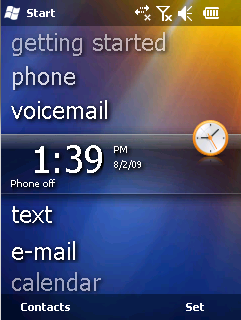
Windows Mobile is a discontinued family of mobile operating systems developed by Microsoft for smartphones and Pocket PCs.
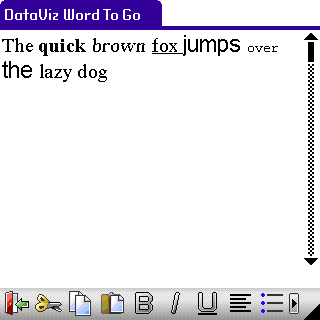
Documents To Go is BlackBerry's cross-platform office suite for Palm OS, Windows Mobile, Maemo, BlackBerry OS, Symbian, Android, and iOS. Also, a larger-screen version would have been included with the Palm Foleo, but Palm, Inc. cancelled the device before its release. The desktop tool, which provides document synchronization between one's handheld device and one's computer, is available for both Microsoft Windows and Mac OS X. On 8 September 2010, it was announced that DataViz had sold the program along with other business assets to Research In Motion for $50 million.
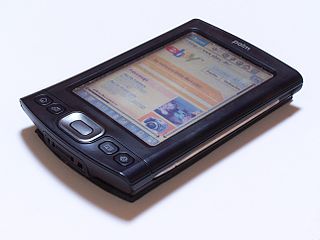
The Palm TX was a personal digital assistant which was produced by Palm, Inc. It was announced and released as part of Palm's October 2005 product cycle, and was in production until March 2009.
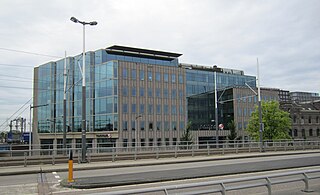
TomTom N.V. is a Dutch multinational developer & creator of location technology and consumer electronics. Founded in 1991 and headquartered in Amsterdam, TomTom released its first generation of satellite navigation devices to market in 2004. As of 2018 the company has 5,077 employees worldwide and operations in 29 countries throughout Europe, Asia-Pacific, and the Americas.
The Access Linux Platform (ALP), is a discontinued open-source software based operating system, once referred to as a "next-generation version of the Palm OS," for mobile devices developed and marketed by Access Co., of Tokyo, Japan. The platform included execution environments for Java, classic Palm OS, and GTK+-based native Linux applications. ALP was demonstrated in devices at a variety of conferences, including 3GSM, LinuxWorld, GUADEC, and Open Source in Mobile.
Olive Tree Bible Software creates Biblical software and mobile apps, and is an electronic publisher of Bible versions, study tools, Bible study tools, and Christian eBooks for mobile, tablet, and desktop devices. The firm is headquartered in Spokane, Washington and is a member of the Evangelical Christian Publishers Association (ECPA). Olive Tree currently supports Android, iPad, iPhone, Macintosh, Windows, and personal computer devices.
The following is a comparison of e-book formats used to create and publish e-books.
A mobile operating system is an operating system for mobile phones, tablets, smartwatches, 2-in-1 PCs or other mobile devices. While computers such as typical laptops are 'mobile', the operating systems usually used on them are not considered mobile ones, as they were originally designed for desktop computers that historically did not have or need specific mobile features. This distinction is becoming blurred in some newer operating systems that are hybrids made for both uses.
Biblical software or Bible software is a group of computer applications designed to read, study and in some cases discuss biblical texts and concepts. Biblical software programs are similar to e-book readers in that they include digitally formatted books, may be used to display a wide variety of inspirational books and Bibles, and can be used on portable computers. However, biblical software is geared more toward word and phrase searches, accessing study bible notes and commentaries, referencing various modern translations, cross-referencing similar passages and topics, biblical dictionaries, original language texts and language tools, maps, charts, and other e-books deemed relevant to understanding texts from a philological approach.
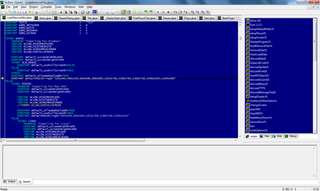
GLBasic is a commercial BASIC programming language that can compile to various platforms including Windows, Linux, Mac OS X, and some handheld devices. The language is designed to be simple and intuitive.

Pleco Software provides an English and Chinese Dictionary application for iOS and Android devices. The Pleco Software company was founded in May 2000 by Michael Love.

